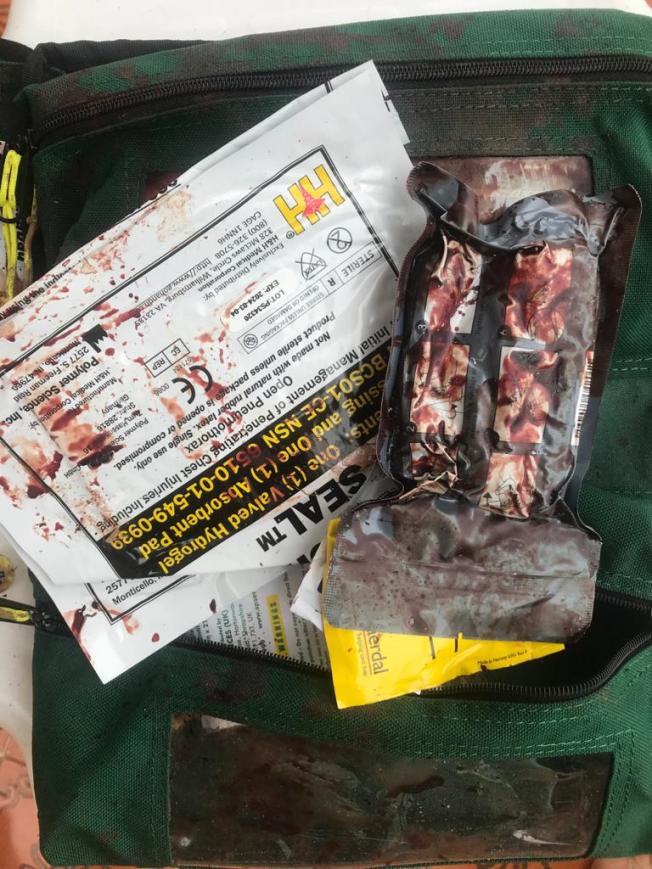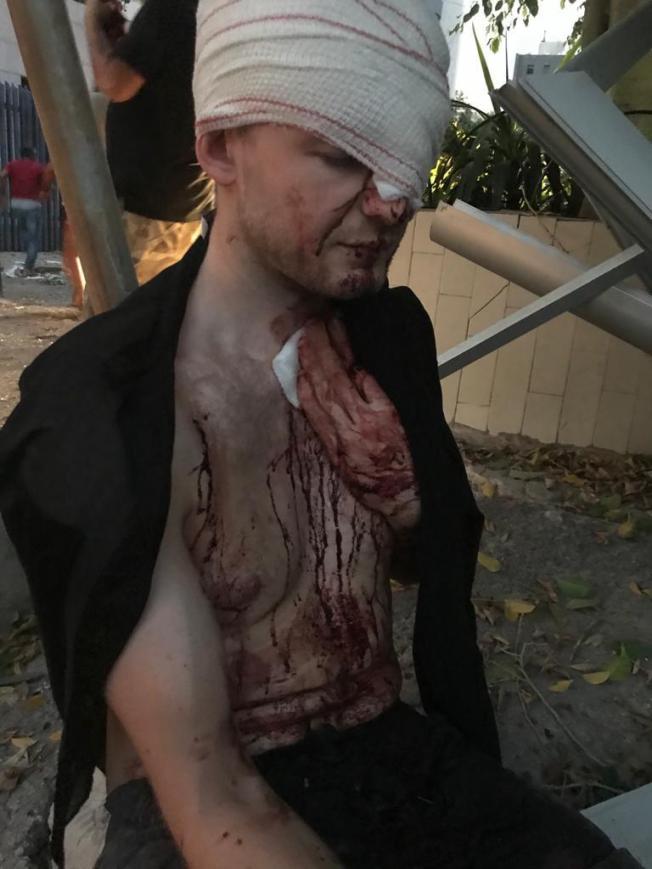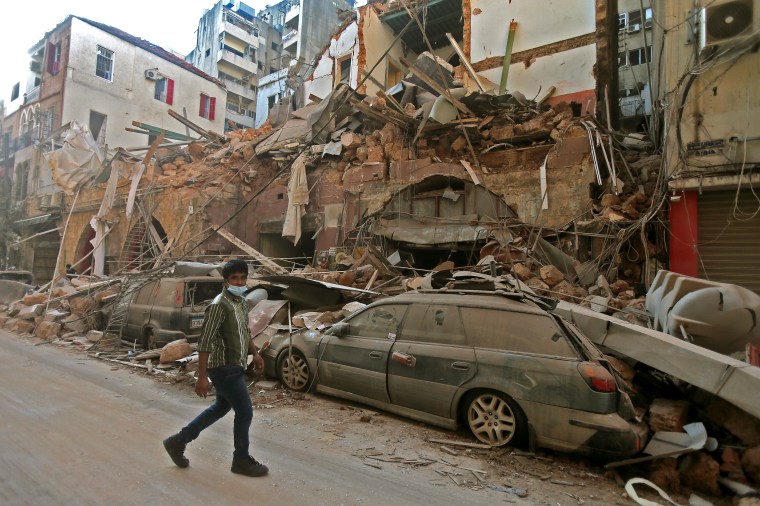Six minutes after the explosion at the Port of Beirut on the evening of August 4, 2020, Natalia Sancha, a correspondent for the Spanish newspaper El Pais, was on her motorcycle, heading to the scene of the blast. Like so many journalists in the city, she was documenting the catastrophe as she was living it.
The large explosion, believed to be caused by a fire at a warehouse in the port that contained a large amount of ammonium nitrate, has killed 149 people so far and injured thousands of others, according to AP. Shocking in its ferocity and scale, the blast tore through apartment buildings, shopping centers, and newsrooms, leaving rubble and debris in its wake.
Reporting on the aftermath has been made more complicated amid reports that the Lebanese army is preventing journalists from doing their job. LCBI Lebanon, a TV station and website in Beirut, said the army detained two of its journalists for entering a prohibited area of the port. A crew from the news channel MTV Lebanon was also detained, Al Arabiya reported. Both crews have been released, according to Al Arabiya. The Lebanese military did not immediately respond to CPJ’s request for comment via email.
CPJ spoke with four journalists in Beirut about reporting on the blast and its impact on their lives and work. The interviews, conducted via WhatsApp voice messages, have been edited for length and clarity.
Natalia Sancha, correspondent at Spanish newspaper El Pais
Where were you when the explosion occurred? What do you remember?
At the moment of the explosion I was at my home. I was in front of the computer having a bite. I remember a huge shaking of the building, then I was thrown in the air and landed on the floor. It was followed up with a huge explosion. The apartment windows in the floors below me were shattered and car alarms started going off. I thought it was either an earthquake or a terrorist attack, a car bomb. I immediately took my cameras and my computers. I went downstairs and got on my motorcycle and started following the smoke.
How soon after the explosion did you start reporting? What did you do?
I started reporting six minutes after the explosion. I went directly to the place of the explosion. Military was in the area, at the port, and there was a lot of smoke. From there I moved to the Gemmayzeh area, which is most affected. It was a catastrophic area; people dead, injured. I don’t know how to explain, it was like Iraq or Syria. It was really like after a bombardment.
What is the situation on the ground right now?
It is really difficult. It was already difficult. I’ve been based in Beirut for 12 years covering the region. We have already been struggling, using generators for 22 hours a day [because of ongoing power shortages]. We are already exhausted from the infrastructure and logistics in this country, which are getting worse and worse. You cannot take a shower or operate a washing machine. I am lucky, my house was not destroyed and I still have electricity and water. Moving around is difficult because of COVID-19. It’s tiring because transportation is difficult. Getting information is also difficult.
How are you keeping yourself safe?
I was scared to be exposed to the ammonium nitrate [believed to be the material that exploded in the blast]. I’m wearing a gas mask, which I take with me when I go to the very center of the bombing. I’m wearing a mask and gloves and glasses when I go to the hospital. I try to stay away from COVID-19, but because I was very fast getting to the point of the explosion — I was running on adrenaline — I helped rescue people from the rubble with bare hands and no mask. When I went to the site initially, I didn’t take a mask. I didn’t take gloves or any protection.
When I visited the site of the blast today, I started having breathing problems and itching in my eyes, nose, and face. Still even now, if you are close to the epicenter, the symptoms will happen. Journalists should be aware that in the area of the epicenter, you should be prepared. Wear long sleeves instead of short sleeves and cover your face and decontaminate and wash when you get home.
What do you need right now to do your job safely?
For most journalists, the biggest support needed right now is good equipment to cover the area, so a gas mask or a COVID-19 mask. I think there’s going to be an explosion of cases after this. Also, good access to the internet and an office open for journalists, a space where we can have internet access. If possible, a shower or a bed so someone can have a little bit of rest.
Kareem Chehayeb, reporter for independent media organization The Public Source
Where were you when the explosion occurred? What do you remember?
I was a 10-minute drive away from the port to do some reporting away from the city. I remember a video that was shared on Twitter from a colleague showing the fire coming from the port from a small blast. I was shocked because I couldn’t find anything on local media, and nobody was talking about it. A few minutes later, everyone said there was a massive explosion that hit the entire city.
I started to report just over an hour later. I spent the first hour calling friends and family and making sure they were OK. Then I suddenly started getting calls from different radio and TV stations asking me to talk about what’s happening. I was reporting remotely for Middle East Eye with updates on what was happening.
I was extremely numb to the situation. It was shocking. I just started to work and not think about things very much, knowing that the vast majority of my friends and family were OK at the time.
What is the situation on the ground right now?
It’s a very difficult situation for journalists right now. In addition to rising amounts of harassment and attacks on journalists, it’s been very hard for them to go in and around the port. I tried to go to the port today with a French rescue team and I wasn’t allowed to go in. Lebanon, of course, has better press freedom than other places in the region, but you’re setting an extremely low bar considering that the region includes countries like Egypt, Turkey, Iran, and Saudi Arabia. Unfortunately, the wiggle room in Lebanon has been shrinking. At a time like this, when journalists really need to have the most space to investigate and hold people in power to account, they fear arrest and reprisal both from the state and political parties, and people with private interests. It’s a tense time, but it’s encouraging to see that so many journalists are braving it and doing everything they can, regardless of what reprisal they may have to face. [Editor’s note: the Lebanese prime minister’s office did not immediately respond to a request for comment sent via email on journalists fearing government reprisal.]
How are you keeping yourself safe?
I carry a first aid kit everywhere I go. I have an extra battery pack. I always follow up with fellow journalists and close friends to let them know where I am. At home I have the curtains closed and try to stay away from glass as much as possible. I have a press card, which I was never able to get in Lebanon, but which I got through the Frontline Freelance Register in the U.K. That helped me get through quite a bit. Lots of journalists have been wearing bike helmets. I have a dust mask which I use in case of tear gas.
What do you need right now to do your job safely?
Journalists in Lebanon right now, especially freelance journalists, could use protective equipment. There aren’t riots at the moment, but when we’re going through the city and talking to people who have lost their homes, lost their business, there is a risk of metal and concrete falling on you. Also, flashlights at night because of the power cuts. Most importantly, a strong network of solidarity and support, especially when you’re seeing inconsistent treatment from the security officials and lots of restrictions to accessing important places for reporting.
Finbar Anderson, independent multimedia journalist
What do you remember from the explosion?
When the explosion occurred, I had just gotten out of the shower. I saw a tweet from my colleague Nabih Bulos at the Los Angeles Times documenting the fire at the port. I was getting ready to go down on my motorcycle to cover the story. Everything from that point is a little bit hazy, but I seem to remember there was the first smaller explosion. I went to my terrace to see what was happening. Thirty-five seconds later the larger explosion happened. I was standing somewhere in the middle of my quite small apartment, which has quite a lot of windows. It’s all a bit of a blur, but I dived underneath the dining room table, where there was already quite a large amount of glass on the floor. It did quite a bit of damage.
Most of the doors in our apartment, including the front door, were blown open. I went downstairs and people were starting to come out of the cafe next door. I realized I was bleeding quite a lot and needed some help to get to hospital. I went back upstairs to my first floor apartment to grab my first-aid kit, the trauma kit that I have for reporting assignments, and my phone and a towel to stem the bleeding. I went back downstairs to get some help and was helped to the car by a couple of strangers who helped me to a nearby hospital.

A trauma kit belonging to independent multimedia journalist Finbar Anderson, after Anderson was injured in the August 4, 2020, explosion at Beirut’s port. (Maryam Saade) 
Independent multimedia journalist Finbar Anderson, after Anderson was injured in the August 4, 2020, explosion at Beirut’s port. (Maryam Saade)
What decisions did you make about reporting?
I very quickly realized that I wasn’t going to do any reporting. I had a [Hostile Environment and First Aid Training] training last November, so I could make an assessment straight away that I didn’t have any catastrophic bleeds, any arterial bleeds. I knew I wasn’t going to lose a catastrophic amount of blood in the first three minutes. I still had a couple of major wounds, so I was still concerned. I realized I certainly did need some kind of hospital treatment.
What are you doing to keep safe?
I’m trying to get to a stage where I’m recovered enough to go out and do reporting without being a liability to anyone. I don’t have any major lasting injuries, but I need to be careful not to aggregate the wounds that I got. It’s a difficult balance of wanting to be on the ground reporting during a major news event, and also not rushing down and becoming a liability to anyone. I can’t walk very fast, and I can’t cover breaking news events right now. I’m also wary of coronavirus. I was exposed to a lot of people on Tuesday who understandably had very little coronavirus protection, so I am trying to be more mindful. If I go down and start seeing more people, taking coronavirus precautions is going to be more important.
Balint Szlanko, coordinator of AP’s Middle East video coverage
Where were you at the time of the explosion?
I was at home. I live quite close to the port where the explosion took place, except the building looks away from the port rather than in the direction of the port. It was still shaking quite badly. I was in the living room and the ceiling came down. I was buried under the ceiling. I was covered in cuts and bruises, but fortunately nothing too serious, just scratches. I had to dig myself out of the apartment and out of the house. The stairwell was full of debris as well. That took about half an hour.
What did you do in the immediate aftermath? Did you report?
I was out in the street and I took a few video clips with my phone and I sent them to the AP in London. I walked to the office, which is in the center of Beirut, and took some more videos on the way. I got to the office, and I discovered I was still bleeding. One of my colleagues with a motorcycle took me to the hospital. I was treated in the hospital, went back to the office, and worked until fairly late.
How are things there now?
I think it’s fine, and we are subject to the same problems as everyone else. It’s very chaotic now, the traffic is very forbidding, so it’s difficult to get to one place and another. A lot of people have lost their homes. I’m staying in a hotel at the moment and having to juggle my work and my personal concerns, like getting my apartment fixed. Going out and taking pictures and interviewing people, that’s fairly easy and that hasn’t really changed.
What do you need to be able to report safely?
Obviously, I need help with fixing my flat and a loss of equipment. My laptop is dead. My landlady has been very helpful, and the AP has been quite helpful. All the equipment that has been damaged is going to be replaced.
Ignacio Miguel Delgado Culebras, CPJ’s Middle East and North Africa correspondent, contributed reporting.
For more information on how to report safely and how to get help, please visit CPJ Emergencies. CPJ Emergencies has safety advisories and safety notes with information for journalists on how to protect your physical, digital, and mental health.
